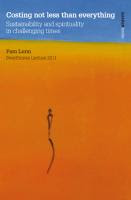I don't, of course, disagree with anything that Paul says here. All of this is obviously necessary. The question is: is it sufficient? Sufficient, that is, to enable an orderly transition to a low/zero carbon world, and not a chaotic collapse of the present order. There's more interesting discussion of all this on the Political Climate blog.......................
Paul had planned to post a response to my comment, but there were technical problems . . . anyway, he's now sent me a piece, and I'm happy to post it here. It's also a 'farewell and best wishes' to Paul, whose position at QCEA ends in a few days' time.
Paul writes:
Second-order change: energy savings & social efficacy
It's a good question, thank you for your comment.
First of all, rationally, and as far as I am aware, even with 80% energy efficiency globally, we will still have to make difficult lifestyle choices elsewhere – making it a really difficult task, on the back of an incredibly big ask. So yes, by implication, you are correct. But if this vision looks implausible, consider the alternatives; we simply can not go on living beyond our means.
While it's true there is no silver bullet to meet our energy needs, there are also definitely a number of duds that we need to remove from further consideration as soon as possible. [Once again, and at the risk of repeating myself, there are faster, cheaper, and less environmentally damaging ways of realising our sustainable energy potential than by embracing nuclear.] By doing so, and grasping with both hands the genuinely sustainable energy solutions with the greatest potential (at the lowest cost!), we also bring the sufficiency threshold closer, making it easier to obtain.
It is also imperative that we avoid the self-fulfilling premise that energy savings and efficiency can't help to meet Europe's energy requirements. As long as the conventional wisdom remains that efficiency savings will be no more than a marginal contributor to our sustainable energy solution in the foreseeable future, policy-makers, private investors and members of the public will be less inclined to take the moon-shot that would allow truly sustainable energy to achieve its full potential.
For me, our supply of energy does not primarily depend on the availability of "natural resources", but on the awareness and the human potential we have at our disposal. First of all, we should recognise and counter the tendency in society to belittle and ‘fence in’ the change required – a tendency promoted so that people can carry on life as normal. Secondly, we need to actively counter the undermining effect of low self- or social-efficacy – the belief that nothing can be done. Research shows that where self-efficacy is low people do not adopt ambitious goals and give up easily when they encounter setbacks in pursuing them. This is, for example, the case with addicts who do not believe that they can maintain sustained control over their habit.
More importantly, as long as problems are seen as merely transactional decisions, and we continue to devote most of our resources to technological solutions, rather than scaling up human-change processes, we will only manage first-order change. That is to say, we will only manage the minor tweaks and the improvements at the margins of our existing cognitive, behavioural, social, and institutional systems that leave the basic goals, structures and – most importantly – outcomes of those systems in tact. Change that gets results – second-order change – is needed. Resembling a social alchemy of sorts, second-order change results in authentically transformative shifts in values, beliefs, and thought processes that produce fundamentally different types of behaviours, practices, institutions, technologies and policies. The challenge being, second-order change does happen(!), but principally through major crisis(!!).
And that is why this is a Quaker issue. Genuine sufficiency not only depends critically on our approach to risk, but also our inward transformation. While I agree, it is absolutely crucial to foster scientifically informed, evidence-based sufficiency policies, frankly, none of us yet has a convincing account of how humanity can get out of this mess, because no forecast, scenario or 'roadmap' is ever going to give a sufficiently correct prediction of our mutual future. Which is unfortunately anathema to a political class eager to believe that nature’s complexity has been mastered. But more significantly, because Quakers have distinctive gifts that the World needs, namely:
• our listening spirituality;
• our approach to discerning the greater good; and
• our experience of striving to live according to that discernment, even when it cuts against societal norms.
And thus, in the spirit of the radical Quaker tradition, by highlighting the tremendous potential and underutilisation of energy savings in our sustainable energy challenge, my purpose is to make hope possible, rather than despair (nuclear power) convincing.
Thanks to Paul for this post.






